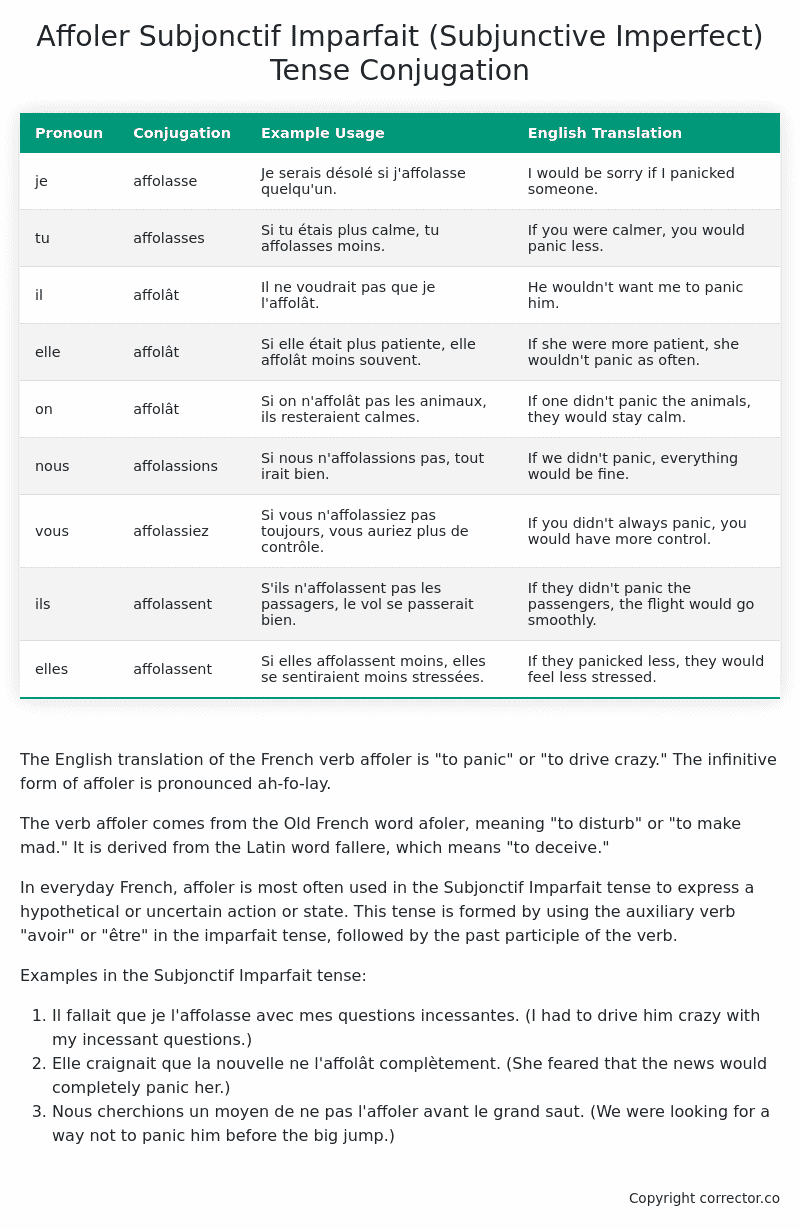Subjonctif Imparfait (Subjunctive Imperfect) Tense Conjugation of the French Verb affoler
Introduction to the verb affoler
The English translation of the French verb affoler is “to panic” or “to drive crazy.” The infinitive form of affoler is pronounced ah-fo-lay.
The verb affoler comes from the Old French word afoler, meaning “to disturb” or “to make mad.” It is derived from the Latin word fallere, which means “to deceive.”
In everyday French, affoler is most often used in the Subjonctif Imparfait tense to express a hypothetical or uncertain action or state. This tense is formed by using the auxiliary verb “avoir” or “être” in the imparfait tense, followed by the past participle of the verb.
Examples in the Subjonctif Imparfait tense:
- Il fallait que je l’affolasse avec mes questions incessantes. (I had to drive him crazy with my incessant questions.)
- Elle craignait que la nouvelle ne l’affolât complètement. (She feared that the news would completely panic her.)
- Nous cherchions un moyen de ne pas l’affoler avant le grand saut. (We were looking for a way not to panic him before the big jump.)
Table of the Subjonctif Imparfait (Subjunctive Imperfect) Tense Conjugation of affoler
| Pronoun | Conjugation | Example Usage | English Translation |
|---|---|---|---|
| je | affolasse | Je serais désolé si j’affolasse quelqu’un. | I would be sorry if I panicked someone. |
| tu | affolasses | Si tu étais plus calme, tu affolasses moins. | If you were calmer, you would panic less. |
| il | affolât | Il ne voudrait pas que je l’affolât. | He wouldn’t want me to panic him. |
| elle | affolât | Si elle était plus patiente, elle affolât moins souvent. | If she were more patient, she wouldn’t panic as often. |
| on | affolât | Si on n’affolât pas les animaux, ils resteraient calmes. | If one didn’t panic the animals, they would stay calm. |
| nous | affolassions | Si nous n’affolassions pas, tout irait bien. | If we didn’t panic, everything would be fine. |
| vous | affolassiez | Si vous n’affolassiez pas toujours, vous auriez plus de contrôle. | If you didn’t always panic, you would have more control. |
| ils | affolassent | S’ils n’affolassent pas les passagers, le vol se passerait bien. | If they didn’t panic the passengers, the flight would go smoothly. |
| elles | affolassent | Si elles affolassent moins, elles se sentiraient moins stressées. | If they panicked less, they would feel less stressed. |
Other Conjugations for Affoler.
Le Present (Present Tense) Conjugation of the French Verb affoler
Imparfait (Imperfect) Tense Conjugation of the French Verb affoler
Passé Simple (Simple Past) Tense Conjugation of the French Verb affoler
Passé Composé (Present Perfect) Tense Conjugation of the French Verb affoler
Futur Simple (Simple Future) Tense Conjugation of the French Verb affoler
Futur Proche (Near Future) Tense Conjugation of the French Verb affoler
Plus-que-parfait (Pluperfect) Tense Conjugation of the French Verb affoler
Passé Antérieur (Past Anterior) Tense Conjugation of the French Verb affoler
Futur Antérieur (Future Anterior) Tense Conjugation of the French Verb affoler
Subjonctif Présent (Subjunctive Present) Tense Conjugation of the French Verb affoler
Subjonctif Passé (Subjunctive Past) Tense Conjugation of the French Verb affoler
Subjonctif Imparfait (Subjunctive Imperfect) Tense Conjugation of the French Verb affoler (this article)
Subjonctif Plus-que-parfait (Subjunctive Pluperfect) Tense Conjugation of the French Verb affoler
Conditionnel Présent (Conditional Present) Tense Conjugation of the French Verb affoler
Conditionnel Passé (Conditional Past) Tense Conjugation of the French Verb affoler
L’impératif Présent (Imperative Present) Tense Conjugation of the French Verb affoler
L’infinitif Présent (Infinitive Present) Tense Conjugation of the French Verb affoler
Struggling with French verbs or the language in general? Why not use our free French Grammar Checker – no registration required!
Get a FREE Download Study Sheet of this Conjugation 🔥
Simply right click the image below, click “save image” and get your free reference for the affoler Subjonctif Imparfait tense conjugation!

Affoler – About the French Subjonctif Imparfait (Subjunctive Imperfect) Tense
Formation
Common Everyday Usage Patterns
Interactions with Other Tenses
Subjonctif Présent
Indicatif Passé Composé
Conditional
Conditional Perfect
Summary
I hope you enjoyed this article on the verb affoler. Still in a learning mood? Check out another TOTALLY random French verb conjugation!


